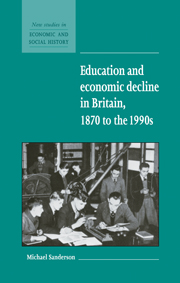Book contents
- Frontmatter
- Contents
- Acknowledgements
- Glossary and abbreviations
- Introduction
- 1 Literacy and schooling, 1870–1914
- 2 Was technical education to blame?
- 3 The counterarguments
- 4 The education of the élite, 1870–1914
- 5 Missed opportunities, 1914–1944
- 6 Post-war decline – the betrayed teenager?
- 7 Higher education and the public schools – privilege and relevance
- Conclusion
- Bibliography
- Index
- New Studies in Economic and Social History
- Studies in Economic and Social History
- Economic History Society
3 - The counterarguments
Published online by Cambridge University Press: 05 June 2012
- Frontmatter
- Contents
- Acknowledgements
- Glossary and abbreviations
- Introduction
- 1 Literacy and schooling, 1870–1914
- 2 Was technical education to blame?
- 3 The counterarguments
- 4 The education of the élite, 1870–1914
- 5 Missed opportunities, 1914–1944
- 6 Post-war decline – the betrayed teenager?
- 7 Higher education and the public schools – privilege and relevance
- Conclusion
- Bibliography
- Index
- New Studies in Economic and Social History
- Studies in Economic and Social History
- Economic History Society
Summary
The view that defects of education held back the economy before 1914 largely held the field through the historiography of the 1960s to 1980s as it had done in most contemporary comment from the 1860s. Yet in recent years many arguments have been advanced questioning this standpoint.
First it can be argued that the British system of education was so transformed between 1870 and 1914 and especially between 1890 and 1914 that it had become an impressive support for industry rather than a liability. Following the shock of the Paris Exhibition of 1867 the system developed in various ways. A number of colleges were started in industrial provincial cities which were to grow into civic universities (Sanderson, 1972). The virtual reform of Owens College Manchester in 1873, moving to its present site in Oxford Road with substantial industrial backing began the trend. This was followed by the Yorkshire College of Science (1874) which was founded as a direct response to the Paris Exibition, then Firth College Sheffield (1879), Mason College Birmingham(1880), Liverpool University College (1881), and before 1914 they were joined by lesser colleges in Southampton (1862), Exeter (1865), Newcastle (1871), Bristol (1876) Nottingham(1881) and Reading(1893). All these institutions were created and funded with money from local industrialists often on a substantial scale. By the mid 1900s Manchester, Liverpool, Birmingham and Leeds all had fixed capitals of around £300,000 to £400,000 and endowment incomes of £8,000 to £23,000 a year.
- Type
- Chapter
- Information
- Publisher: Cambridge University PressPrint publication year: 1999

